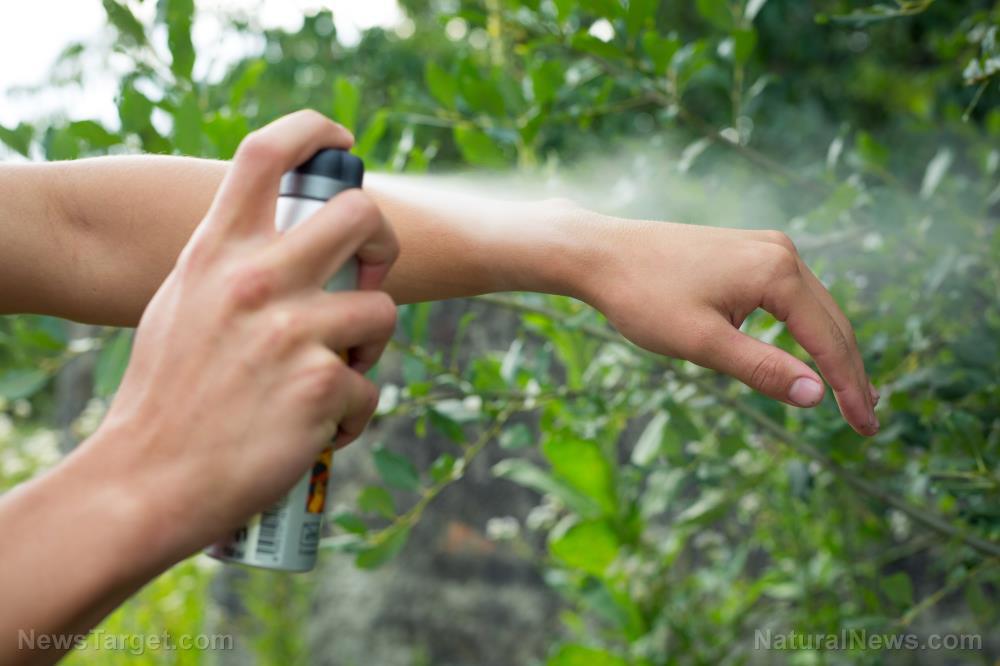
The latest public health scare to make headlines is malaria, which the powers that be say is spreading in Florida and Texas by infected mosquitoes. With this news comes increased demand for mosquito remediation protocols, including natural remedies.
There are well-known mosquito repellant chemicals like DEET (N,N-diethyl-meta-toluamide), allethrin, N,N-diethyl mandelic acid amide, and dimethyl phthalate that are approved by United States regulatory agencies – but are they safe?
Chemical-based mosquito repellants such as these might work, but they are also dangerous. They harm synthetic fabrics and plastics and cause adverse reactions such as allergies, dermatitis, and cardiovascular and neurological damage.
"Using synthetic repellents has disturbed ecosystems, contributed to insecticide resistance, the resurgence of mosquito populations, and has adversely affected other organisms," one report explains about additional problems caused by these chemicals.
Rather than use chemicals, why not try applying essential oils like citronella, eucalyptus, lavender, peppermint, or basil to your skin? These have been scientifically shown to naturally repel mosquitos without the need for DEET or other similar chemicals.
There are also safe and effective anti-malaria drugs such as hydroxychloroquine (HCQ) that can give you and your family piece of mind in the event that you are bitten by mosquitoes.
Malarone, chloroquine, doxycycline, mefloquine, primaquine, and tafenoquine – all of these can be taken prophylactically to keep your body protected against a possible malaria infection.
"Hydroxychloroquine, a well-known immunomodulatory drug approved by the FDA has been used for 60 years to treat malaria," reports explain.
"Because of its long elimination half-life of 30 to 45 days, weekly dosing can prevent malaria, and a brief 48-hour treatment course can be used to treat the disease once acquired."
(Related: Did you know that billionaire eugenicist Bill Gates unleashed genetically modified [GMO] mosquitoes that are secretly "vaccinating" people without their consent?)
Applying essential oils to your skin is a great natural way to repel mosquitoes
One of the easiest ways to protect against mosquito bites and a possible malaria infection is to create an environment around your home and outdoor spaces that mosquitoes hate. This includes:
• Removing all unnecessary standing water from all areas around your home.
• Repairing damaged windows and door screens to prevent mosquitoes from entering your home.
• Using ultraviolet (UV) light traps to lure and catch mosquitoes.
• Using air conditioners, dehumidifiers, and fans to help cool down a space and regulate humidity.
• Timing outdoor activities to avoid dusk and dawn.
• Wearing long-sleeve shirts and pants whenever working outside – don't forget socks.
• Washing off sweat from your skin to deter mosquitoes from being attracted to it.
• Creating an outdoor firepit and having bonfires, the smoke from which repels mosquitoes.
• Using citronella candles whenever and wherever mosquitoes are a problem.
Concerning the essential oil approach, a 2019 systematic review published in the Malaria Journal looked at 62 different studies on their effectiveness against Anopheles mosquitoes, which are notorious for causing malaria.
"Ligusticum sinense extract, followed by citronella, pine, Dalbergia sissoo, peppermint, and Rhizophora mucronate oils, had the highest repellent effects, with protection ranging from 9.1 to 11.5 hours," the study found.
"Essential oils from plants such as lavender, camphor, catnip, geranium, jasmine, broad-leaved eucalyptus, lemongrass, lemon-scented eucalyptus, Amyris, eucalyptus, carotin, cedarwood, chamomile, cinnamon oil, juniper, cajeput, soya bean, rosemary, niaouli, olive, Tagetes, violet, sandalwood, Litsea, galbanum, and Curcuma longa also repelled different species of mosquitoes for around eight hours."
Basil, garlic oil, witch hazel, topical apple cider vinegar, and catnip are also powerful repellants for mosquitoes.
"We make our own jewelweed juice for poison ivy and that works, too," one commenter wrote about another natural remedy.
"Recently while getting bit around the campfire, we discovered if we sprayed our ankles, arms, etc. with jewelweed juice, the bugs seemed to leave us alone."
More news about natural remedies can be found at Natural.news.
Sources for this article include:
Please contact us for more information.


















